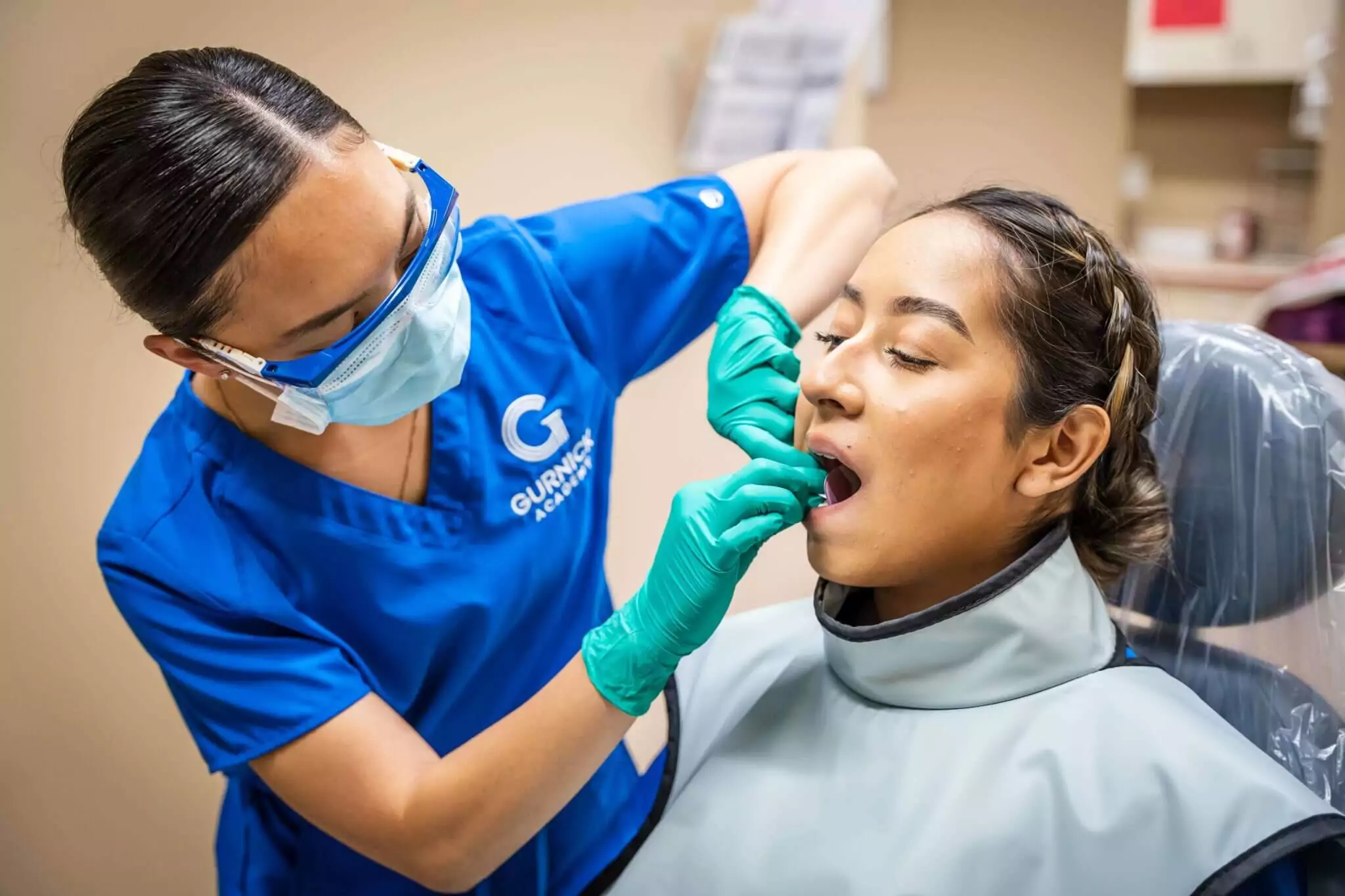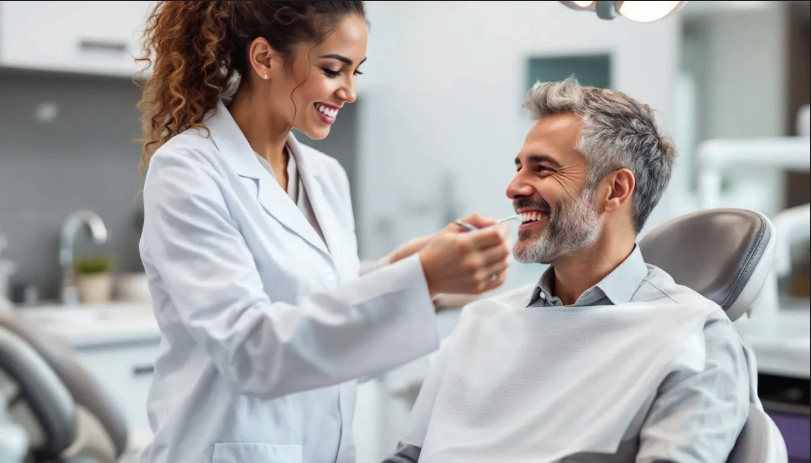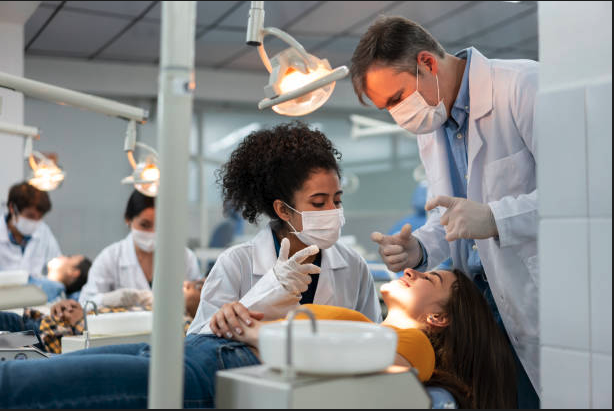Table of contents
Get Started with Kwikly
Get the latest updates, insights, and exclusive content delivered straight to your inbox.
If you’re wondering how long dental hygienist school actually takes, here’s the deal. Most people go the associate degree route, which is about 2-3 years. That’s your minimum to get started. But maybe you’re thinking bigger picture - bachelor’s or master’s degrees take longer, sure, but they open up way more doors.
Each educational option represents a different career path in dental hygiene, offering unique opportunities and growth potential depending on your goals.
We’ll break down each path so you can figure out what works for you.
What You Need to Know
- You’ve got options when it comes to dental hygiene school - associate, bachelor’s, or master’s degrees. Each one comes with its own educational requirements and gets you different opportunities.
- Make sure whatever dental hygienist program you pick is accredited by the Commission on Dental Accreditation (CODA). Trust us, you don’t want to mess around with this part.
- Once you’re working, you’ll need continuing education to keep your license. It’s just part of the job, but it also keeps you sharp and can boost your career.
Your Education Options
So you want to become a dental hygienist. Here’s what you’re looking at:
- Associate degree: Often called a dental hygiene associate degree, this is where most people start. Takes about 2-3 years and gets you working faster.
- Bachelor’s degree: More time invested, but you’ll have better job prospects and probably make more money.
- Master’s degree: If you’re thinking leadership roles or maybe teaching someday, this is your path.
Each option has its perks, and it really depends on what you’re after.
Dental hygiene programs aren’t just sitting in classrooms all day. You’ll get a mix of book learning and hands-on training at actual dental clinics. Many programs require prerequisite courses in science and math before admission. The programs cover everything from dental anatomy and radiology to working with real patients under supervision. That clinical experience isn’t just something to check off - it’s where you really learn the job. These programs are designed to prepare students for both licensing exams and real-world practice. The whole point is making sure you can walk into any dental office and know what you’re doing.
Picking your path comes down to your goals and how fast you want to get working:
- Associate degree: Gets you in the workforce quicker.
- Bachelor’s degree: Takes longer but opens more doors and usually means better pay.
- Master’s degree: For when you want to run things or teach others.
Whatever route you go, becoming a dental hygienist is challenging but worth it. Higher education can help you advance in the field, and some students pursue a science degree as part of their educational journey. You’ll make a real difference in people’s oral health.
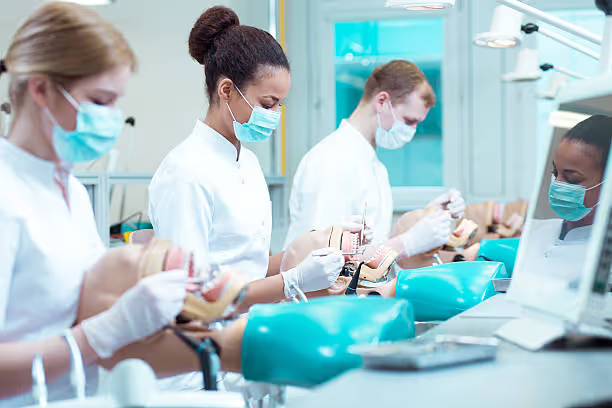
Associate Degree: The Quick Start Option
Most people who become dental hygienists start with an associate degree. These programs are offered by technical schools as well as community colleges and usually take 2-3 years, though some places offer accelerated options that you can knock out in about 23 months. If you’re eager to get working and start earning, this is probably your best bet.
The coursework gives you everything you need. You’ll do classroom work, lab time, and clinical training. From pretty much day one, you’re working with real patients while someone experienced keeps an eye on you. It’s nerve-wracking at first, but that’s how you build confidence. You’ll cover the essentials like dental anatomy, radiology, periodontics, and pharmacology. The associate degree specifically prepares you for the job duties required of a dental hygienist, ensuring you can meet the responsibilities expected in dental practices.
By the time you graduate, you’re ready to do the job. You’ll know how to clean teeth, spot signs of oral diseases, and handle all the preventive care stuff. Some programs even prepare you to work with kids as a pediatric dental hygienist. The hands-on experience during school means you won’t be completely lost when you start working in dental offices or clinics. You’ll actually know what you’re doing, and as a graduate, you’ll be qualified to work in private dental offices.
Bachelor's Degree: More Time, More Opportunities
A bachelor’s degree in dental hygiene is a type of dental hygiene degree that typically takes 4 to 6 years to complete. While it’s a bigger commitment than the associate route, earning this key credential is essential for career advancement. You’ll be more competitive when you’re job hunting, and you’ll qualify for roles that associate degree holders can’t touch.
This dental hygiene degree sets you up for teaching and more advanced positions. You could end up in public health, corporate dental practices, or other specialized areas. Better education usually means better pay and more interesting work.
The job outlook for dental hygienists is pretty solid. Growth is expected to be faster than average from 2021 to 2031. Having a bachelor’s degree in dental hygiene makes you stand out to employers and positions you for leadership roles down the road. If you can swing the extra time and cost, this dental hygiene degree can really pay off in the long run.
Master's Degree: The Top Tier
If you want to go all the way, a master’s degree is where it’s at. These programs take about two years and are designed for dental hygienists who already have a bachelor’s degree and want to take their careers to the next level.
With a master’s degree, you can:
- Teach at universities
- Get into research and help advance the field (master’s programs often include training in research principles to support the scientific basis for dental hygiene practice)
- Work in community health outreach
- Specialize in prevention and health sciences
You could be teaching the next generation of dental hygienists or doing research that changes how oral health care works. It’s a serious investment, but if you want to be at the top of your profession, this is how you get there.
Getting Ready in High School
Students interested in a dental hygiene career should focus on science and math courses in high school to meet future prerequisite requirements.
Your path to dental hygiene actually starts in high school. You need to graduate with a high school diploma or equivalent - that’s non-negotiable for getting into any dental hygiene program. Math and science courses are crucial because they set you up for the more advanced stuff you’ll tackle later.
You should aim for three years of English and two years of algebra. You’ll also want a year each of chemistry and biology. These give you the scientific foundation you’ll need. While it’s not required everywhere, two years of a foreign language and courses that help with communication skills, like speech class, can give you an edge.
Getting involved in health-related activities or volunteering can also help. Maybe shadow some dental professionals or get involved in school health programs. This stuff looks good on applications and gives you a better idea of what you’re getting into. If you focus on these areas in high school, you’ll be in good shape for dental hygiene programs.
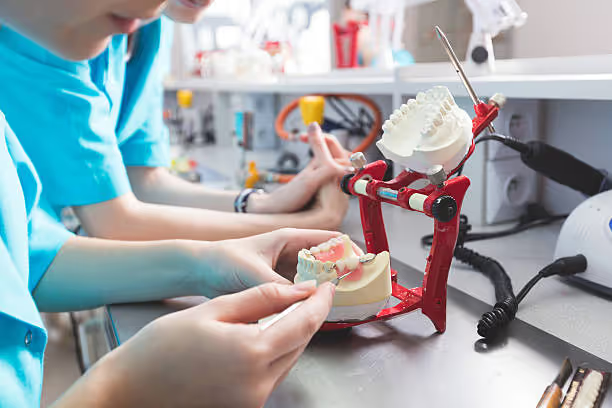
Why Accreditation Matters
Don’t mess around when it comes to picking a dental hygiene program. Only consider an accredited dental hygienist program, as these are recognized by the Commission on Dental Accreditation (CODA) and the U.S. Department of Education. Make sure it’s accredited by the Commission on Dental Accreditation (CODA). Here’s why this matters:
- It protects you by ensuring the program meets high standards
- Programs get reviewed regularly to make sure they’re doing their job
- It ensures you’ll actually be prepared to work when you graduate
The whole point of accreditation is making sure graduates can provide safe, effective dental care. The Commission on Dental Accreditation keeps an eye on programs to make sure they’re meeting quality standards.
In many states, you can’t even get licensed unless you graduate from an accredited program. So picking an accredited school isn’t just smart - it’s essential for actually being able to work as a dental hygienist.
Choosing the Right Dental Hygiene School
Picking the right dental hygiene school is a big step toward a successful dental hygiene career. With so many dental hygiene programs out there, it’s important to do your homework before making a decision. Start by making sure the dental hygiene program is accredited by the Commission on Dental Accreditation (CODA) and recognized by the American Dental Association. Dental accreditation isn’t just a box to check—it’s your assurance that the program meets the highest standards and will prepare you to become a licensed dental hygienist.
Look closely at the curriculum. A strong dental hygiene program should cover everything from oral health and dental hygiene practice to medical ethics and patient care. You want a program that balances classroom instruction with real-world experience in a dental hygiene clinic or dental office. Many dental hygienists say that hands-on clinical experience is what truly prepares you for the demands of the job.
Program length is another key factor. If you’re eager to start working, an associate’s degree in dental hygiene from a community college or technical school can get you there in about two years. If you’re thinking about long-term career growth, a bachelor’s degree in dental hygiene might be worth the extra time. Some students also consider the cost and convenience of community colleges, which often offer quality education at a lower price.
Ultimately, choosing the right dental hygiene school means finding a program that fits your goals, your schedule, and your budget. Take the time to visit schools, talk to current students, and ask about clinical experience opportunities. By selecting an accredited dental hygiene program that matches your needs, you’ll be setting yourself up for a rewarding and successful dental hygiene career.

What to Expect from Clinical Training
Clinical training is where everything you’ve learned in the classroom comes to life. In any accredited dental hygiene program, you’ll spend a significant amount of time working directly with patients in a dental hygiene clinic or private dental office. This hands-on experience is essential for developing the skills you’ll need as a dental hygienist.
During clinical training, you’ll learn how to assess a patient’s oral health, perform dental cleanings, and educate patients on good oral hygiene techniques. You’ll get comfortable using ultrasonic tools, taking dental X-rays, and even administering local anesthesia—all under the direct supervision of licensed dental hygienists. This is also your chance to practice effective communication, as you’ll be explaining treatment options and teaching patients how to protect their teeth and maintain good oral health.
You’ll work with a wide range of patients, from children to seniors, and may even get a taste of what it’s like to be a pediatric dental hygienist. Clinical experience also covers important topics like medical history, infectious diseases, pain management, and gum disease prevention. The combination of classroom instruction and real-world practice ensures you’re ready for anything you’ll encounter in a dental office.
By the end of your clinical training, you should feel confident in your ability to provide high-quality patient care and be well-prepared for the licensure exam to become a registered dental hygienist. Many dental hygienists say that clinical experience is the most valuable part of their education, giving them the skills and confidence to launch a fulfilling career as a dental hygienist. With the demand for dental hygienists on the rise, according to labor statistics from the United States Department of Labor, completing your clinical training is a smart step toward a stable and rewarding future in oral health.
Getting Licensed to Work
Every state requires dental hygienists to have a license. No exceptions. The licensure process usually involves passing the National Board Dental Hygiene Examination and a regional or state clinical exam. These tests check both what you know and how well you can actually do the job.
Some states have their own specific requirements on top of the national exams. In California, for example, you have to complete the Application to Practice Dental Hygiene through WREB. Successful completion of all required exams is necessary for licensure. The Joint Commission may be involved in administering certain licensure exams, depending on the state. Once you get licensed, you’ll need continuing education to keep it active. It’s just part of staying current with new practices and developments.
Keeping Up and Moving Forward
Continuing education isn’t optional in dental hygiene - it’s required to keep your license active. Dental hygienists work closely with dentists to maintain and improve each patient's oral health, performing routine cleanings and assisting with preventive care. You’ll need to complete a certain number of hours covering things like infection control, medical ethics, and pain management. It keeps you up to date and helps you educate patients better.
Dental hygienists work in a variety of settings and perform essential duties to support dental teams, from patient education to assisting with preventive dental procedures. Some states let you do self-study courses for continuing education credits. Others count volunteer work toward your requirements. This flexibility means you can tailor your learning to what interests you and what you want to do with your career.
Advanced education and certifications can really boost your career prospects. Specialized training or certifications can lead to more responsibility and better pay. Whether it’s formal education or continuing education courses, investing in learning pays off in the dental hygiene field.
How Kwikly Helps You Put Your Education to Work
You've put in the time and effort to get through your dental hygiene program—whether it's an associate, bachelor's, or even master's degree. Now you need to find work that actually fits your life and what you're trying to do. That's where Kwikly comes in.
We're the go-to dental staffing platform in the U.S., and we help licensed dental hygienists get to work fast, easy, and however works for them. Maybe you just graduated and want to start getting real experience. Maybe you've been doing this for years but need better flexibility. Either way, Kwikly gives you hundreds of open shifts right in your area, all in one spot.
Bottom Line
Becoming a dental hygienist gives you plenty of options, whether you're going for an associate degree to get working fast or pursuing advanced education for leadership roles. Accreditation and licensing are must-haves, not nice-to-haves. Continuing education and career advancement opportunities make this profession rewarding long-term. If you understand these different paths, you can make smart choices about your education and look forward to a career that really makes a difference in people's oral health.
Questions You Probably Have
What's the minimum education to become a dental hygienist?
You need at least an associate degree, which takes about 2-3 years. That's your entry point into the profession.
How long does a bachelor's degree in dental hygiene take?
Usually about 4 years, but it can take up to 6 years depending on the program and your situation.
What do I need to do to get licensed as a dental hygienist?
You'll need to pass the National Board Dental Hygiene Examination and a regional or state clinical exam. These make sure you're qualified to work safely and effectively.
Why does accreditation matter for dental hygiene programs?
Accreditation ensures the program meets educational standards and actually prepares you for a successful career. It's your quality guarantee.
What can I do with a master's degree in dental hygiene?
You can teach, do research, work in community health outreach, or specialize in prevention. These advanced roles let you impact public health and train future professionals.




